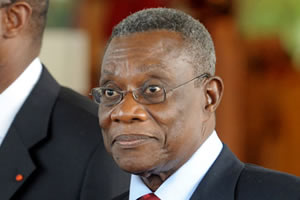Ghana president dies after illness: presidency

The late president had recently travelled to the United States for what had been described as a routine medical checkup.
Condolences began pouring in for the late leader, including from Nigerian President Goodluck Jonathan.
Jonathan “assures the people of Ghana of the sympathy and solidarity of the people of Nigeria as they mourn late President Mills, who did his best during his tenure to carry forward the process of democratic consolidation and socio-economic development in Ghana.”
Mills took over as Ghana’s president in January 2009.
He narrowly won the vote in 2008 with a less than one percent margin against a candidate from the party of incumbent John Kufuor, widely respected for having bowed out following his two terms in office.
In July last year, Mills was nominated to be the ruling National Democratic Congress party’s presidential candidate for December 2012 elections.
The primary represented the first time in the country’s history that a sitting president competed for his own party’s nomination.
Mills beat his only rival in the party primary, Nana Konadu Agyemang Rawlings, the wife of ex-military leader Jerry Rawlings.
He rose to prominence in 1997 when Rawlings named him vice president — a position he held until the former coup leader-turned-elected president made way for Kufuor after the 2000 elections.
After finishing his law studies in Britain, Mills came home to teach law for 25 years at a Ghana university.
Ghana, a country of some 25 million people, recently joined the ranks of the world’s large-scale oil producers. It was the country chosen by Barack Obama for his first visit to sub-Saharan Africa as US president in 2009.
The country has begun producing oil from its offshore Jubilee field, one of the largest discoveries in West Africa in recent years. The field’s operator Tullow has estimated that the field’s recoverable resources amount to up to one billion barrels.
While Ghana has been widely lauded for its democratic credentials, its newly found oil wealth has brought with it warnings of the so-called resource curse, with many pointing to nearby Nigeria as an example.
Nigeria, Africa’s largest oil producer, has long been held back by deeply rooted corruption and mismanagement, while aspects of its economy outside of oil have been neglected.








Comments